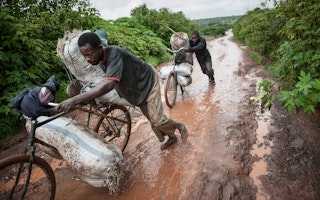Why the EU Must Take the Lead on Burma Democracy
By Neil Campbell
The upcoming elections in Burma on November 7 and the possible release of Aung San Suu Kyi a few days later have transfixed policy discussions on one of the most closed societies in the world. Rather than using this opportunity to come up with a common and proactive approach, the European Union has instead allowed the ruling military junta’s manipulation of events to split its policies and bring into question its commitment to international law.
European opinion on Burma is polarized. In the free Burma camp (see for example Burma Campaign UK) are those convinced that there can be no reasoning with Than Shwe, Burma's military dictator, without external pressure to reform. Free Burma activists also say that elections will not only be a sham but will also entrench and protect the military order since voting will take place under the 2008 constitution (view pdf) which was only ratified after a fraudulent referendum.
In the Myanmar engagement camp are those who see decades of failed sanctions, minimal improvement of internal conditions and an aging junta. For them, the flawed election process could be a small step in the right direction.
This is a gross oversimplification of the varied voices engaged on Burma, but the link between the two camps, and all those in between, is the common desire to improve Burmese lives in line with international human rights and humanitarian law. Disparate interest groups, NGOs, and governments are all essentially on the same side of the moral border even if their policy prescriptions are not.
Five years since the landmark Responsibility to Protect doctrine was agreed on at a UN summit, the currency of international law has devalued considerably. In March 2010, UN Special Rapporteur Tomas Ojea Quintana reported that human rights violations in Burma could amount to crimes against humanity or war crimes. Quintana also called for a Commission of Inquiry (CoI) to investigate the atrocities. Currently the best option available is to have the CoI mandated by the UN General Assembly.
Other avenues for establishing the CoI, the Security Council, Secretary-General or Human Rights Council, suffer from a combination of a Chinese veto, unnerved leadership and/or a lengthy process. For unexplained reasons it is the EU that drafts the resolution on Burma for this Committee. It is the EU, not China, that has the next move to make on Burma policy.
This will be the first UN General Assembly under the EU's new Lisbon Treaty. The first at which the EU has an international legal personality (if not representation), an ongoing institutional shakeup and leadership changes designed to make it a more effective actor on the global stage.
Now that they have a seat at the table, the predominant concern of European policy makers should be to reflect the fundamental rights all 27 EU member states have agreed to, rather than use the Burmese resolution as a risk-free public diplomacy exercise.
There are two boats in the policy discussion at EU level.
The first, belonging to the junta, must not be rocked. The second, belonging to the EU’s resolution, must not be overloaded. The junta’s vessel contains the false promise of the election and the looming release date for Aung San Suu Kyi, all of which should be allowed to develop without outside interference.
For the EU’s boat, a resolution that pushes too hard on an the Commission of Inquiry risks the embarrassment of sinking at the UN. Both arguments have resulted in nominal support for the CoI but a delay for concrete steps until after the elections, therefore possibly shutting the UNGA door for another year on a mechanism designed to assess ongoing atrocity crimes.
This is a rare opportunity to exercise what little joint leverage exists at a global level on Burma and to unite the Myanmar/Burma camps on a common line. This is not the time for the EU or the UN to be selective about its commitment to international law.
Quintana was not suggesting isolated and sporadic incidents of human rights abuses but state policy that “involves authorities in the executive, military and judiciary at all levels.” The scale and method of atrocities suggested should register at the highest level of international condemnation.
The current convergence of events, keenly manipulated by the junta, has managed to weaken the moral logic that connects the various Burma lobbies, including EU member states, the European Commission, Parliament, and EU foreign policy chief Catherine Ashton.
At last count nine EU member states (Ireland, UK, France, Holland, Czech Republic, Slovakia, Hungary, Estonia and Lithuania) have publicly supported establishment of a formal UN inquiry, but at last week’s meeting of member-state human rights officials, explicit inclusion of the Commission in a UN resolution was shelved.
It was predictable that the junta would manipulate events to give itself as much space as possible from international pressure. It should not be unfortunate we are now looking to the EU to lead the international response.

Neil Campbell is director of policy planning for Advocacy at the Open Society Foundations.


